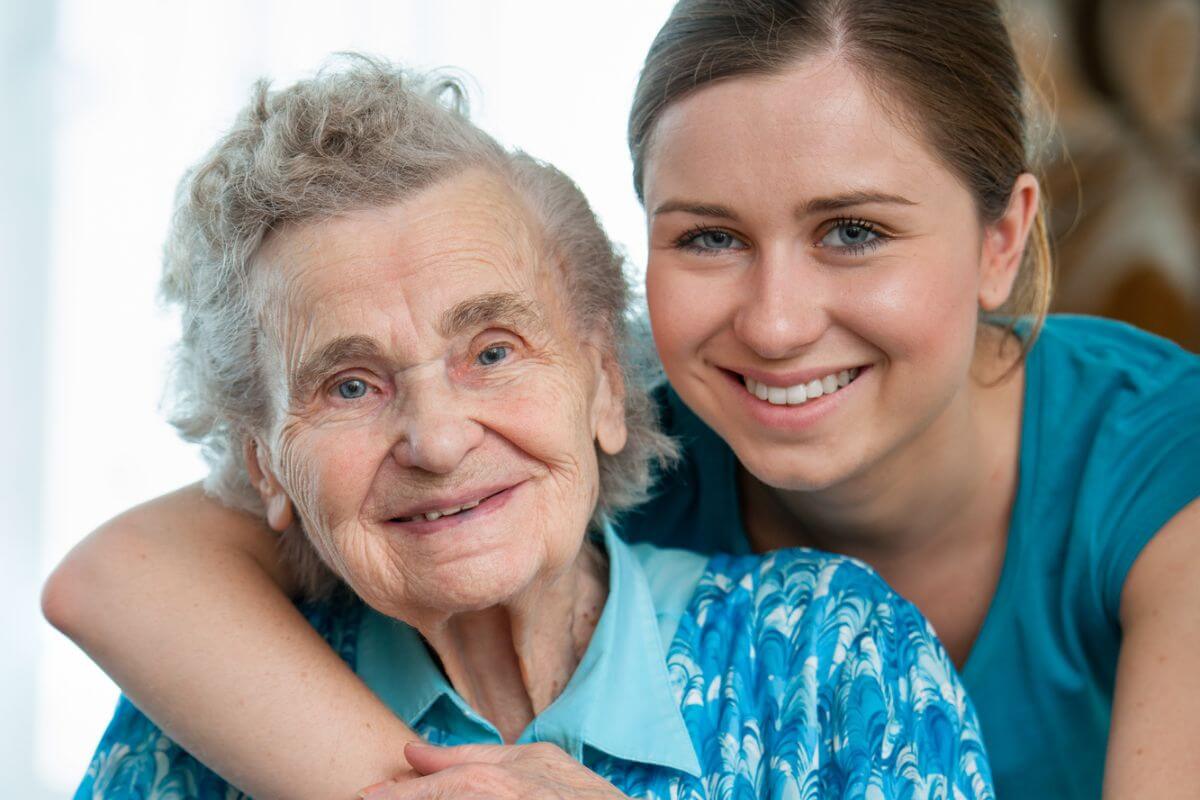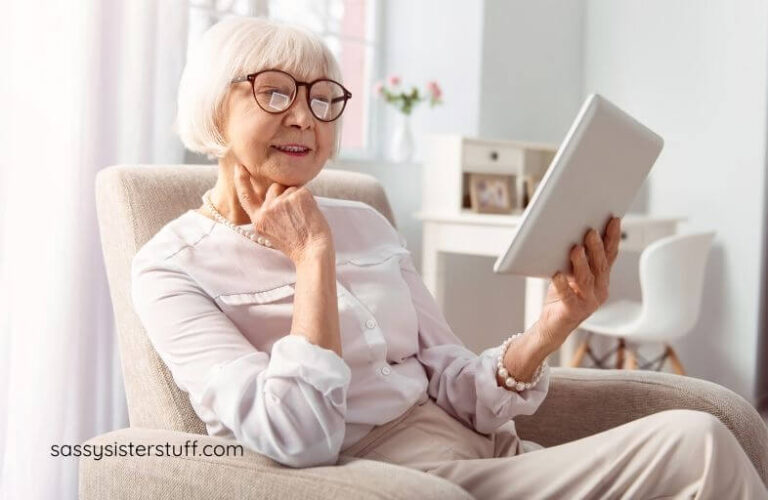Senior Care Items to Improve Hygiene and Quality of Life
As we watch our parents age, we often find ourselves transitioning into very new roles—caregivers, companions, and advocates for their well-being.
While living with my 90-year-old father for nine months prior to his passing, I discovered items that would help with his basic personal hygiene. It wasn’t merely about cleanliness; it was about helping to preserve his dignity, enhance his comfort, and impact his overall quality of life.

In this article, I am going to shed light on the often-overlooked aspect of senior care—personal hygiene—and how it intertwines with quality of life for our beloved seniors.
I hope you recognize why maintaining dignity and quality of life in the twilight years is a vital aspect of compassionate caregiving. So, let’s move on to the list of senior care items to improve hygiene and quality of life for those we love.

Senior Care Items to Improve Hygiene and Quality of Life
Electric Razor: Since many older people have thin skin, and may take blood thinners for chronic health conditions, it is dangerous for them to use a sharp razor. They also may struggle with vision and fine motor skills that make it even more complicated. To avoid injury, we purchased an electric razor that was highly recommended on Amazon and other sites for the elderly. This proved to be a valuable resource because my dad was able to maintain his independence in this aspect of personal care.
New Television: This may sound strange for a list of senior care items to improve hygiene and quality of life, but it wasn’t until I moved in with him that I discovered my dad could not see or hear the television in his living room. He would sit and watch without knowing what was going on but never told anyone. This caused him to have limited access to what was happening around the world; he was always very interested in the news. The new TV helped him improve his quality of life and connect with the world again.
Adjustable Bed Frame: This was something we purchased to improve my dad’s quality of life. He was able to maintain his independence as well as get a good night’s sleep. He could get in and out of bed independently and use the bed adjustments to get comfortable at night. Thus, he had more productive and happier days.
Nail Kit: My dad had not been able to clip his toenails by himself for a while, so he lost his clippers. Proper foot care is super important for the elderly because of fungus growth. Thus, I got him a nice nail kit that included large nail clippers for toenails and other tools for his fingernails. We shared responsibility for his personal care, so I managed his feet, and he took care of his hands with the new nail kit. This gave him some independence while still allowing me to help.

First Aid Kit: When I moved in with my dad, I quickly learned that his first aid supplies were spread all over the house. Band Aids, antibiotic ointments, wraps, wound tape and bandages, gauze pads, antiseptic, thermometer, tweezers, small pair of scissors, latex gloves — everywhere. I found things in drawers, closets, and cabinets all over the house. When the first accident happened, I realized we needed to have a first aid kit that I could put my hands on easily, so I gathered everything and created a first aid kit that we kept readily accessible in his bathroom closet. This way we could treat injuries quickly and avoid skin infections.
Disinfectant Wipes and Sprays: Best practices dictate that the elderly live in a clean home to avoid germs and illness. Thus, I made sure we had disinfectant wipes and sprays everywhere around the house so we could wipe down all surfaces frequently. This allows the elderly to continue to have visitors and socialize with less worry about getting sick. I wiped off doorknobs often and carried disinfectant hand wipes with us when we left the house so I could help him clean his hands often.
Scales: Since my dad had heart disease, it was important to keep track of his weight and the potential of fluid retention. New scales were more accurate and reliable than his old ones. He became very independent with weighing himself daily and recording the information so we could take the information to his doctor.
Extra Robes and Pajamas: It was helpful to have extra robes and pajamas as my dad’s health deteriorated. With many chronic health conditions and some mild cognitive impairment, he would sometimes get messy while eating, doing normal daily tasks, or during the night. Since he was more comfortable in his pajamas and robe, we got extras to have available in case of accidents. This helped us maintain his basic hygiene and cleanliness.
Bedside Table: My father did not have a bedside table next to his bed, so I felt it would be helpful to add one to his bedroom. Here, we made sure Dad had water, Kleenex, hand wipes, the bedframe remote, the TV remote, his glasses, and anything else he felt he needed. It wasn’t anything fancy — it just served the purpose of keeping essentials next to him so he could have some independence while in bed.

Shower Chair: Shower chairs help reduce falls, but they can also help older people bathe properly and maintain better personal hygiene. Secure shower chairs can help elderly people access personal hygiene products with less risk of falling and reach all parts of their body that need attention. A long-handled shower brush is safer to use from a chair, too. A shower chair will help seniors avoid skin infections and allow them to continue activities of daily living.
Grab Bars: We put grab bars in the bathrooms next to the toilet seats and in his shower to help with safety. A number of older adults prefer to have raised toilet seats, which are also excellent for safety, but my father preferred to have grab bars next to the toilets. These helped preserve his dignity and independence. In the shower, it also helped aide him in cleaning his private parts and reaching for things.
Gentle Soap and Body Lotion: As people get older, their skin becomes more sensitive and drier. My dad would even get rashes on his body that were sometimes hard to clear up. Thus, his health care provider recommended a few different kinds of gentle soaps and body lotions. We tried several of them and we chose what seemed to work best for his self-care practices.
Non-scented Clothes Detergent and Dryer Sheets: It’s important for senior citizens to have clean clothes, thus laundry should be done regularly. I found it was necessary to purchase non-scented clothes detergent and dryer sheets because my dad’s skin became more sensitive as he aged, and he would get itchy rashes. The non-scented detergents and dryer sheets helped improve this problem.
Disposable Bed Pads: Although my dad did not have a problem with incontinence, we found there were enough incidents during the night that disposable bed pads were helpful. When he had an accident, we could clean up quickly and go back to sleep without stripping the bed. I learned that the waterproof bed pads saved lots of frustration and embarrassment for him. He got very upset when he had an accident and we had to be up in the middle of the night changing the bed sheets.

Anti-bacteria Soap at Every Sink: With the risk of Covid and other diseases, we needed to constantly worry about Dad’s overall health, especially since he had a compromised immune system (as many older folks do). So, I bought anti-bacterial soap and put it at every sink in the house. Using it regularly became part of Dad’s daily routines. This was an easy way for Dad to feel involved in his own care. He proudly told all in-home care providers about washing his hands often to keep from getting sick.
Video Montor: We got a video monitor for my dad’s bedroom so we could monitor him at night. When he was sick, this allowed him to have his privacy without anyone hovering over him at night. Plus, he knew he could call me through the voice box if he needed anything, thus we both felt some peace of mind. He was able to get uninterrupted sleep because he knew I would quickly know if something happened to him (ie: heart attack, stroke, cardiac arrest, vomiting, etc.)
There were a few things that I did not need to worry about with my dad. He had great oral health hygiene and healthy teeth. He never had gum disease and saw his dentist regularly. So, this was not a concern as it can be for some older people. But it should be considered when helping an elderly person with personal care and quality of life.
We also didn’t have to worry about bed rails or medical alert systems. He always slept on his back and didn’t move in his sleep. And, since I was living with him and used a video monitor, we didn’t need a medical alert system. But these things should be considered for most older people.

Why is Personal Hygiene Important for the Elderly?
This section highlights the multifaceted importance of personal hygiene in elderly people, emphasizing its role in their health, mental well-being, social connections, and overall quality of life.
Personal hygiene holds immense importance for people of all ages, but it becomes especially pivotal for the elderly. As people age, their bodies undergo a number of changes that can impact their ability to maintain proper hygiene without assistance.
Mobility limitations, cognitive decline, chronic illnesses, and other age-related factors often pose challenges in maintaining good hygiene practices. Despite these hurdles, personal hygiene for the elderly should be a priority for several reasons:
- Health Maintenance: Effective personal hygiene significantly contributes to preventing illnesses and infections. As individuals age, their immune systems may weaken, making them more susceptible to infections. Regular bathing, dental care, handwashing, and grooming routines help minimize the risk of infections, skin conditions, and oral health issues.
- Enhanced Mental Well-being: Personal grooming activities promote a sense of dignity, self-worth, and confidence. Maintaining a clean appearance and feeling fresh can positively impact an elderly individual’s mental health, fostering a sense of independence and boosting self-esteem.
- Prevention of Skin Complications: Aging skin tends to become thinner and more fragile, making it prone to skin conditions such as bedsores, rashes, and irritations. Proper hygiene practices, including regular bathing and moisturizing, play a vital role in preventing these complications and maintaining skin health.
- Social Interaction and Relationships: Maintaining good personal hygiene facilitates social interactions and strengthens relationships. Feeling clean and presentable encourages participation in social activities, fostering connections and reducing the risk of social isolation, which is common among older adults.
- Overall Quality of Life: The ability to maintain personal hygiene directly correlates with an individual’s overall quality of life. By addressing hygiene needs, the elderly can experience greater comfort, reduced discomfort from health issues, and an improved sense of well-being.
Caregivers and family members play a crucial role in assisting older adults in maintaining proper hygiene, ensuring they receive the necessary support to sustain a high quality of life.

What is Quality of Life for the Elderly?
This section highlights the multifaceted nature of quality of life for the elderly, encompassing physical health, emotional well-being, social connections, independence, environmental factors, and overall life satisfaction.
Quality of life for the elderly encompasses various aspects that contribute to their overall well-being, happiness, and satisfaction in their later years. It’s a holistic measure that takes into account not just their health but also their emotional, social, and environmental circumstances. Here are key elements that define quality of life for older adults:
- Health and Physical Well-being: While health is just one part of the equation, it’s undeniably crucial. Good health and hygiene enable the elderly to engage in daily activities, maintain independence, and enjoy a fulfilling life. However, it’s not solely about the absence of illness but also about managing chronic conditions, pain, and mobility issues effectively. Additionally, hearing loss can create issues that impact quality of life. By wearing hearing aids, the senior can hear better and facilitate enhanced communication among family members and friends. The person wearing them may not need to turn the TV up so high anymore and can avoid feelings of isolation and loneliness.
- Emotional Well-being: Emotional health is equally important. Feeling content, having a sense of purpose, and managing stress or mental health conditions like depression and anxiety significantly impact an elderly individual’s quality of life. Support systems, coping mechanisms, and opportunities for social engagement play pivotal roles here.
- Social Connections and Relationships: Maintaining relationships with family, friends, and the community is vital for the elderly. Meaningful social connections reduce feelings of loneliness and isolation, fostering a sense of belonging and support. Active participation in social activities contributes positively to their overall happiness.
- Independence and Autonomy: Retaining independence for as long as possible is a significant aspect of quality of life for older adults. Being able to make choices, manage daily activities, and have a sense of control over their lives contributes greatly to their well-being.
- Environmental Factors: The living environment greatly influences an elderly person’s quality of life. Accessibility, safety, comfort, and the availability of supportive resources like healthcare services, transportation, and community programs all impact their day-to-day experiences.
- Life Satisfaction and Fulfillment: Feeling satisfied with life, having opportunities for personal growth, pursuing hobbies, learning new things, and feeling a sense of accomplishment all contribute to a higher quality of life.
Quality of life for the elderly is a multidimensional concept that encompasses various aspects of health, happiness, independence, and social connectedness.
Family members can address these things to help ensure a more fulfilling and enriched life for older adults they love.
However, sometimes in-home health care services can significantly enhance quality of life and should be considered by the family.
Professional in-home caregivers can help with daily activities like bathing, dressing, meal preparation, medication reminders, and more—helping seniors maintain their dignity and routine while remaining at home.
In-home providers can help relieve feelings of isolation and increase emotional well-being while working closely with the family. However, it’s important to learn about caregivers and look at care.com reviews that help connect families with reliable in-home care.

Final Thoughts: Senior Care Items to Improve Hygiene and Quality of Life
It’s obviously important for us to help our aging parents maintain good hygiene, healthy habits and have access to a good quality of life. In addition to some of the items I have shared above, the elderly need to have regular physical activity and see their doctors regularly to reduce the risk of chronic diseases.
The bottom line is many elderly folks can live productive and happy lives for much longer than in the past. So, let’s do what we can to make that happen!
If you need help, please seek support from local organizations for the aging and consult with your parents’ healthcare provider. They may be able to refer you to a social worker who can help you access support services. You can also learn more at the National Council on Aging (NCOA) where they promote the well-being of seniors.
I hope by sharing my experiences, you are able to more confidently take an active role in supporting your loved ones during their senior years and helping them maintain good hygiene and a good quality of life.
Love to ALL! ~ Susan
Related Articles:







